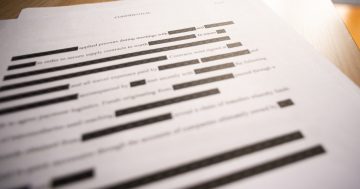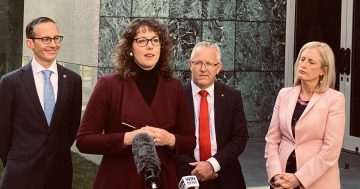
Prime Minister Anthony Albanese’s Labor government uses the public interest immunity excuse to deny the release of documents more than Scott Morrison’s government did. Photo: Thomas Lucraft.
Anthony Albanese’s Labor Federal Government is worse than the Coalition government led by Scott Morrison when it comes to releasing documents for public scrutiny.
That’s the outtake from the Centre for Public Integrity’s new research report which found when it came to Freedom of Information (FoI) requests and Senate orders to produce documentation, Labor was failing to comply at a high rate.
The last term of government saw a decided drop to comply with requests and orders to publicly release documents, worsening a trend that has become entrenched over the past two decades.
The think tank has called for an independent legal arbiter to review how governments hide behind the excuse of public interest immunity (PII) to refuse releasing documents.
“Transparency is the cornerstone of democratic governance, yet Australia’s federal executive continues to undermine it through increasing non-compliance with Senate orders for documents,” the report states.
“New data reveals a precipitous fall in compliance from 92 per cent in the 1993-96 Parliament to a mere 33 per cent currently.
“This decline coincides with a troubling rise in unilateral claims of public interest immunity (PII), where the executive withholds information without independent oversight, potentially obscuring misconduct or politically sensitive issues.
“Alarmingly, under the Albanese government, PII claims occur weekly – three times the frequency of the Morrison government.”
Of all noncompliance in Labor’s first term, 67.9 per cent has been attributable to PII claims compared to 61 per cent in the Morrison government.
In 2022, 90 per cent of non or partial compliance involved unilateral claims of PII.
The current rate of PII claims significantly outpaces that of the Morrison government.
In the 46th Parliament, over its 1014 days in office, the Morrison government made 47 PII claims in noncompliance or partial compliance Senate orders for documents, equating to about one PII claim every three weeks.
The 1040 days of the Albanese government’s first term in the 47th Parliament saw 142 PII claims against Senate orders – about one claim every week.
There is currently no way of knowing how many of these claims were valid.
The government can hide behind the PII excuse without justification or further explanation.
The Centre for Public Integrity says its analysis reveals the system of unilateral PII claims is not fit for purpose and instead serves to “undermine a core Australian constitutional tenet” of responsible government.
“Executive dominance in the House of Representatives, incidental to Australia’s Westminster system of government, means it frequently falls upon the Senate to perform the scrutiny functions of responsible government,” its report states.
“The government of the day has also historically rarely had Senate majorities – allowing the Senate to make credible threats to the passage of legislation if demands are not met.
“One of the Senate’s most powerful tools in holding the executive to account is its ability to order the production of government documents…
“Yet executive compliance with such orders is not guaranteed: not only are sanctions for noncompliance lacklustre, a government may also avoid providing documents by claiming ‘public interest immunity’ (also known as ‘Crown privilege’ or ‘executive privilege’ in other contexts).”
The report says compliance has fallen to new historic lows since the early 1990s. The Albanese government’s record to comply with Senate production orders in the 47th Parliament represents the second-lowest ebb in recent history.
The attitude is also rendering the FoI laws close to being redundant, the think tank suggests.
Its study found that in the 2022-23 financial year (all of which fell in the first term of the Albanese government), more FoI requests were refused than fully granted to applicants – the first time this has been the case.
ACT independent Senator David Pocock said the statistics were a bad look for Labor, and the high rate of PII claims in denying the release of documents was simply “not good enough”.
“Labor talked a huge game in Opposition about transparency,” Senator Pocock said.
“They’ve come in and been one of the worst governments since 1993.”
The centre says its recommendation for an independent legal arbiter will be a disincentive for the executive government to “make spurious privilege claims and otherwise unjustifiably resist access”. It will also provide an independent review mechanism for parliament’s requests for documents and require accountability in respect of executive claims of privilege.
“Unilateral PII claims are incompatible with responsible governance, significantly hampering parliament’s ability to perform critical oversight,” the report says.
“The Centre for Public Integrity recommends establishing an independent legal arbiter within Senate Standing Orders, empowering impartial review of privilege claims and deterring unwarranted secrecy.”
Original Article published by Chris Johnson on Region Canberra.








